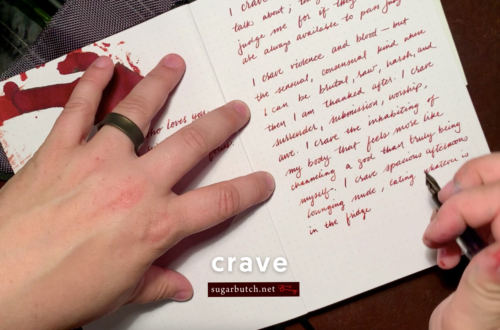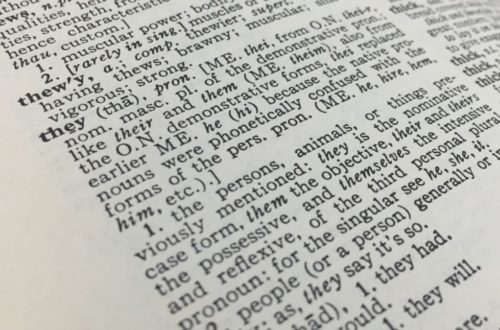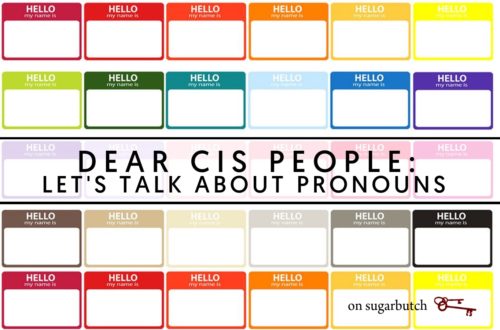I’m not sure exactly where the term spectrum banging came from—my friends and I used it in college, I have a feeling someone made it up. Google doesn’t seem to use it the way I do.
I find it a useful concept, though, and use it frequently. Spectrum banging is when you go from one end of the spectrum to the other so fast and furiously that you bang yourself against the other end.
For example, you date someone who is a little bit loony tunes, and that ends badly, and the next person you date is a completely uptight and prim-and-proper. Spectrum banging.
Or, you come out of the closet and come to your queer identity in college, suddenly away from your birth family unit and able to explore yourself, and you completely cover your dorm room in rainbows, and exclusively go to gay bars, exclusively watch gay movies, exclusively listen to gay music, etc etc. Spectrum banging.
I’ve used this in lots of other examples, too, not just sexuality or dating. I was just discussing it last night in some of the aftercare and fallout from d/s, and the ways my own triggers cause me to spectrum bang and have really strong reactions (that are sometimes too strong).
I tend to be pretty resistant of the concept of spectrums in general—I think things are usually more multi-faceted than a binary, usually at least three if not a whole galaxy. But often the reaction to something is specifically a spectrum, and we tend toward the opposite, perhaps so far unable to see the other possible paths or responses.
Sometimes, there is a sense that where you “should” be on the spectrum is somewhere in the balanced middle—but that is not necessarily the case. Sometimes banging the spectrum can result in the spectrum becoming bigger (or 3D, or some other format), and perhaps that “banging” is actually where you—or your friend or ex or whomever—will end up. What spectrum banging refers to is often a phase, sure, but it is also sometimes a real transition, so be careful about the judgment attached to this phrase.
Is this term useful for you? Got an example of this you can think of?




I think the fact that "spectrum banging" supports binary systems is ok because we don't notice changes that happen in a multifaceted way as much as we do those can can easily be placed on a linear spectrum. We need terms to describe the reactions we have to large amounts of oppositeness. Like how multifaceted change is viewed as "wow, you've been changing a lot" as opposed to "OMG! You just changed into the complete opposite of what you were!". That oppositeness, I think, necessarily exists on a spectrum and I think the oppositeness is what gets our attention.
like the way bold contrasts stand out more than grey areas
Spectrum banging also really defines my coming out. I was a late bloomer and I'm pretty sure managed to catch up on 20 years of gay culture in one year. I went from being a "straight" socially conservative home-schooled kid to an outgoing lesbian sadomasochist that helps run sex parties in a very short amount of time.
The more common "rebounding" doesn't have such a binary connotation, even less with "recoiling from" something.
I usually see most things as an array–particularly things like gender, where you can be more or less masculine AND also more or less feminine. They aren't exclusive nor inclusive so don't fit well on a spectrum.
A speculum otoh…well that only helps sometimes.
I find that idea kinda amusing! :)
When I first found out that transition was possible I embraced manly masculinity like never before. My doctors all thought my 'presentation' was top notch, and it made it really easy to get on hormones etc. I had permission, nay, INCENTIVE to be as manly as I wanted for the first time in my life and it was AWESOME.
For about 2 months. Then I banged up against the wall, and wandered back to somewhere like my 'natural' gender. Which is kinda hyper-butch, hyper-femme, in a queer way. No one can tell if I'm a butch dyke or a sissy fag, these days. All they know when they look at me is that I'm some kinda queer!
I don't like the idea of a gender spectrum much, but it is a useful way of explaining it to people.
– Step one, get them to disconnect biological gender (aka sex) and presentation/identity
– Step two, The newbie usually comes up with this concept of a spectrum themselves at this point, and shooting them down isn't helpful. Explain the idea of someone being able to move along the 'spectrum' that they are now imagining gender is.
– Step three, introduce the idea that someone could inhabit multiple points on that 'spectrum' simultaneously. Concrete examples are helpful. (Effeminate bears? Jock twinks? Lipstick lesbians? Butches who do girl drag? What ever they are most familiar with)
– Step four, point out that perhaps a 'spectrum' isn't the most useful analogy for gender if people can inhabit multiple points at once.
Thats my tactic anyway. :)
This is the phrase that describes my life, and I never knew it till now.
I love opposites. I love both ends of the spectrum (many, many spectrums), and will thus often swoop back and forth between them.
Re: Spectrum vs. 3+D models
A friend of mine recently asked why I was characterizing my most recent stage of spiritual development as "grey" – a merging of black and white, ego and shadow, etc – rather than an array of all colors. I explained that that's how it works in the crayon box – and it's true. My deep self thinks in Crayola terms, not the physics of light, so it's what makes sense. But even more so, the spectrum is *manageable* – and banging around on it has let/will let me get to a point where I can branch off of the linear spectrum onto the whole great color wheel. I *know* there's a whole multi-dimensional world of and in myself – but I needed to deal with something a bit simpler, for now.
i love it.
I had to think about the term for a bit and then I remembered a time in my life where "spectrum banging" was all too appropriate.
Actually, in writing this, I've come to realize that "Spectrum banging" characterizes most of my life stages, from prepubescent, to emerging sexuality, to now.
As an adult I can now say that spectrum banging is useful to me in that I have been on both sides and many points in the middle, which as a human allows me to connect to more people than before, since I can meet them at a familiar point.
Useful little phrase!